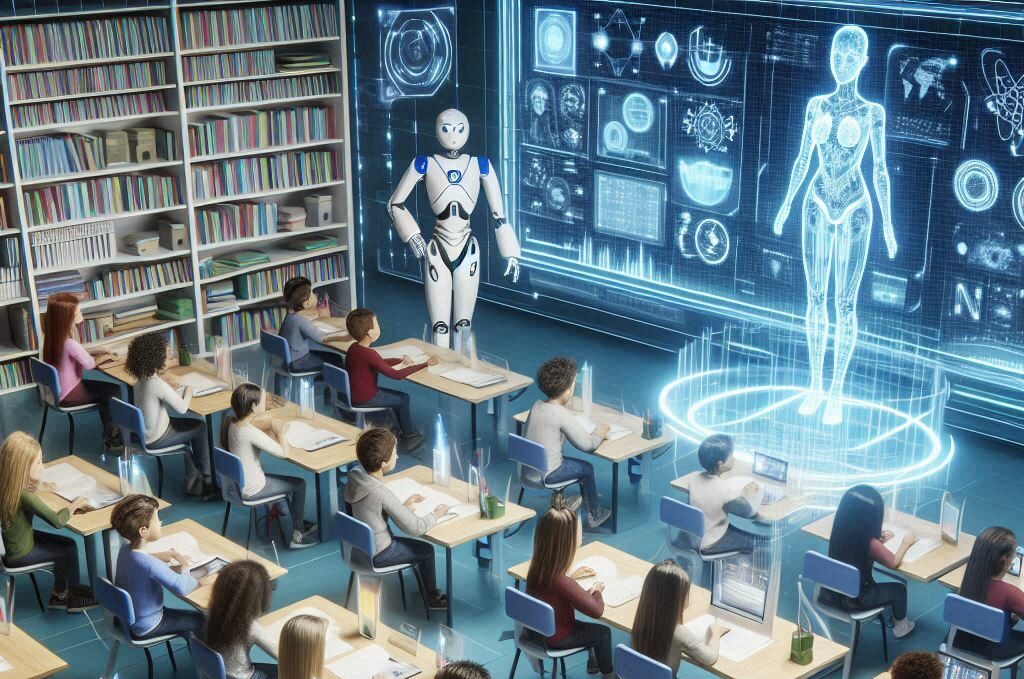AI in Education: Personalized Learning Experiences Through AI
In today’s digital age, AI is transforming education by creating personalized learning experiences that cater to individual student needs. This revolutionary approach leverages advanced algorithms to analyze data and provide tailored educational content, enhancing the learning journey for each student.
Understanding AI in Education
AI in education involves the use of artificial intelligence technologies to support and improve the educational process. These technologies include machine learning algorithms, natural language processing, and data analytics, which collectively enable personalized learning at scale.
Personalized Learning: The Future of Education
Personalized learning through AI adapts educational content based on a student’s unique learning style, pace, and preferences. Here’s how AI is revolutionizing education:
- Tailored Learning Paths: AI-driven platforms assess a student’s strengths and weaknesses, creating customized learning paths that align with their academic goals. This ensures that each student receives the appropriate level of challenge and support.
- Adaptive Learning Systems: These systems use real-time data to adjust the difficulty of tasks and provide instant feedback, helping students to stay engaged and motivated. By continuously adapting to the learner’s progress, AI makes education more dynamic and responsive.
- Intelligent Tutoring Systems: AI-powered tutors offer personalized assistance and guidance, simulating one-on-one interactions with human tutors. These systems can answer questions, provide explanations, and offer additional resources to help students understand complex concepts.
- Predictive Analytics: By analyzing student data, AI can predict future performance and identify potential challenges. Educators can use these insights to intervene early and provide targeted support, improving student outcomes.
Key Technologies in AI-Driven Education
- Machine Learning: Enables systems to learn from data and improve their performance over time without explicit programming. It’s the backbone of personalized learning algorithms.
- Natural Language Processing (NLP): Allows AI systems to understand and respond to human language, making it possible to create interactive and conversational learning environments.
- Data Analytics: Collects and analyzes vast amounts of data to identify patterns and trends, helping to personalize the educational experience for each student.
Companies Leading the Way in AI Education
Several companies are at the forefront of integrating AI into education, providing innovative solutions to enhance personalized learning:
- Knewton: Offers adaptive learning technology that personalizes educational content to match individual learning needs.
- DreamBox Learning: Provides an AI-driven math program that adapts to a student’s unique learning path and offers real-time feedback.
- Carnegie Learning: Uses AI to deliver personalized math tutoring and practice, helping students to build confidence and mastery in mathematics.
- Coursera: Incorporates AI to offer personalized course recommendations and enhance the learning experience for online students.
- Duolingo: Utilizes AI to create personalized language learning experiences, adapting lessons based on user performance and preferences.
Future Trends in AI-Driven Education
The next 5 to 10 years will likely see significant advancements in AI-driven education, leading to more sophisticated and integrated learning experiences:
- Increased Accessibility: AI will make personalized learning accessible to students worldwide, breaking down barriers related to geography, language, and resources.
- Enhanced Collaborative Learning: AI will facilitate collaborative learning by connecting students with peers and educators, enabling dynamic and interactive learning environments.
- Lifelong Learning: With AI, personalized learning will extend beyond traditional education, supporting lifelong learning and continuous skill development.
- Data Driven Insights: AI will provide deeper insights into student learning patterns and behaviors, helping educators to refine teaching strategies and improve educational outcomes.
AI in education is poised to revolutionize the way we learn, offering personalized and engaging learning experiences for students of all ages. As technology continues to evolve, the potential for AI to enhance education is limitless, paving the way for a more adaptive, inclusive, and effective educational system.
Real-Time Examples
- Virtual Assistants: Platforms like Google Assistant and Alexa are being used in classrooms to help students with their studies.
- Smart Classrooms: AI-powered smart classrooms can adjust lighting and temperature based on student activity and needs.
- AI-Powered Textbooks: Textbooks enhanced with AI offer interactive content that adapts to student responses.
AI Courses to Consider
- Coursera: Courses like “AI For Everyone” by DeepLearning.AI offer foundational knowledge in AI.
- edX: Provides courses such as “CS50’s Introduction to Artificial Intelligence with Python” by Harvard University.
- Udacity: Offers nanodegree programs in AI and machine learning.
Best Areas of Study for Future Trends
- Machine Learning and Deep Learning: Core areas for developing AI models.
- Natural Language Processing (NLP): Important for creating conversational AI and interactive learning tools.
- Ethics in AI: Understanding the ethical implications and responsible use of AI.
- Data Science: Essential for analyzing educational data and personalizing learning experiences.
- Computer Vision: Vital for applications like image recognition in educational tools.
Focusing on these areas will prepare you well for the evolving landscape of AI in education over the next decade. The integration of AI into education is set to transform learning, making it more personalized, engaging, and effective. As technology continues to advance, the potential for AI to enhance education is limitless, paving the way for a more adaptive, inclusive, and efficient educational system.

